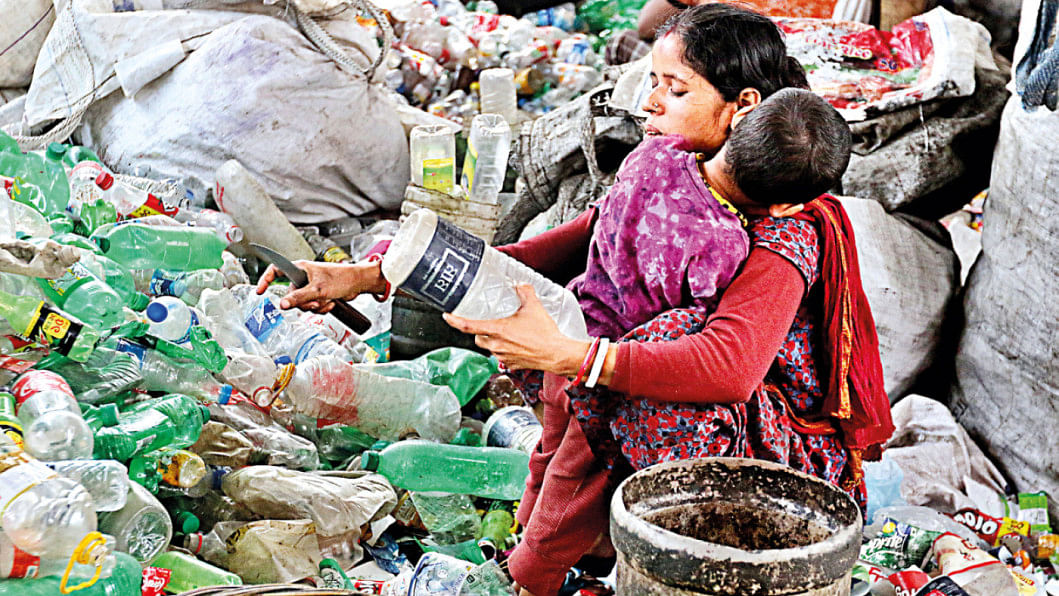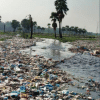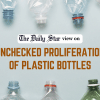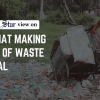Why change must start with people

On World Environment Day, the conversation around plastic pollution takes centre stage—globally, in treaty rooms and international campaigns, and locally, as we stare at rivers choked by waste and fields littered with non-biodegradable remnants of daily survival. But too often, we isolate the plastic crisis from the human beings at its centre: the families, farmers, vendors, and millions for whom plastic is not a convenience but a necessity—a needed tool for carrying goods to work on a rainy day, building shelter to withstand torrential rains when there is no roof overhead, or simply storing belongings when even a tin trunk is unaffordable.
Plastic must be removed from our lives, for it kills—whether through choking rivers and oceans, or through the CO2 emitted in its production. But this can only happen when alternatives become reachable for the unrecognised faces who use it daily, not just for ease but for necessity. In a country like Bangladesh, where the vast majority live on the edge of survival, affordability and availability dictate choice. The conversation around alternatives must begin by asking: What will people use instead? And how will they afford it? If those answers remain unclear, expecting sudden behavioural shifts or blanket bans is not only unrealistic, it is unjust.
We need to find a solution that is both humane and environmentally responsible. We cannot presume to restrict plastic use only through regulation. We must provide alternatives and instil an understanding of the harm it causes, especially among those who rely on it most. People must feel connected to the cause, to understand that this is about protecting the rivers, the land, and the environment we all share. When the message speaks to the heart, not just through statistics or enforcement, it inspires collective responsibility. That is where real, lasting change begins.
Today, we speak of climate treaties and plastic bans. But unless the state becomes personal—unless the farmer understands why it matters to him, unless the mother in a char village sees what plastic waste might do to her child's future—we will not see real transformation. A policy that asks millions to give up a necessity must not descend like an order. It must rise from understanding, built through empathy and communicated in language that respects people's lives and acknowledges their realities.
The global plastic treaty being negotiated, as reported in IISD's Earth Negotiations Bulletin, is a welcome step. But it must not absolve us of our responsibilities at home. Plastic is already having an incredibly negative impact on the quality of our lives. Our rivers are clogged. Our waste systems are inadequate. While international consensus can help us gain legitimacy in our actions, we are already suffering daily from the lack of regulation and alternatives. We cannot wait for consensus to take shape. We need to act now—but act wisely—so that the millions who rely on plastic today are able to shift to alternatives, even if those alternatives are not yet as useful.
At the same time, we must resist imported narratives that do not fit our context. Western countries, with their histories of industrial growth, carbon emissions, and pollution, have created much of this crisis. But this is not about them feeling guilt. Guilt can be brushed aside—by individuals, by corporations. What we must appeal to is conscience. One person's conscience can lead hundreds to positive action. If there is to be a global commitment to healing, it should not be framed as reparations for the past, but as a response to the suffering of the present. Let conscience, not compensation, guide the way forward.
Back home, we must learn to see the nuances. Not all plastic is single-use or wasteful. In Bangladesh, we reuse everything. A plastic bottle may be used for months. Plastic furniture allows families to live with dignity. On a recent visit to a shop in Kachua, I was handed a plastic bag labelled "100 percent biodegradable." Bioplastics like those being developed by Sonali Bag may hold promise. But we must ensure that sustainability does not become another form of inequality, where the poor are penalised for using what they can afford, while the rich purchase expensive "eco" products.
Even a seemingly progressive decision, such as banning plastic and requiring only glass in offices, raises valid questions. The intention is noble. But how do small businesses comply? What happens to vendors who cannot afford the transition? Policy without inclusion becomes exclusion.
So, what should we do?
We must begin with awareness that respects, not lectures. Speak to people in their own language—not only linguistically, but through their lived experience. Show them that if the rivers are blocked, if the fish die, if the soil degrades, their own lives will be affected. And then, crucially, provide real alternatives. No one wants to harm the environment. But no one should be forced to choose between dignity and sustainability.
It is possible to mobilise people—especially the young—when they feel part of a collective mission. It is possible to educate without blame. To act without alienating. To build, not just ban.
Let us mark this World Environment Day not with more slogans, but with sincerity. Let us appeal not just to policies and politics, but to the hearts of people. Because only when environmental responsibility becomes personal, deeply human and emotionally understood, will we begin to see real change.
Let us make the state personal. Let us make conscience our most powerful policy.
Runa Khan is founder and executive director of Friendship.
Views expressed in this article are the author's own.
Follow The Daily Star Opinion on Facebook for the latest opinions, commentaries and analyses by experts and professionals. To contribute your article or letter to The Daily Star Opinion, see our guidelines for submission.


 For all latest news, follow The Daily Star's Google News channel.
For all latest news, follow The Daily Star's Google News channel. 








Comments